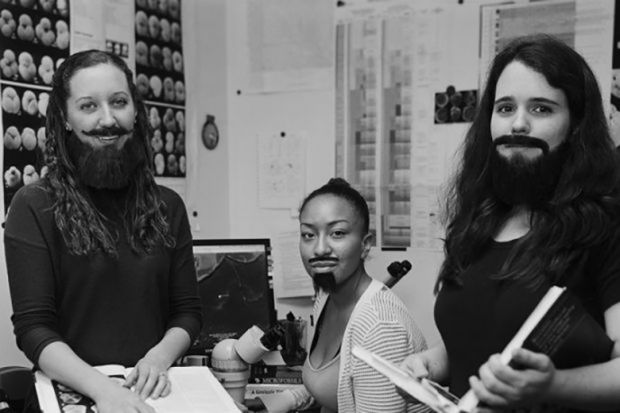It is a tired trope that women working in research must learn to blend into a predominantly male environment in order to get the job done without any hassle.
But a group of US palaeontologists took this approach to the extreme when they made the decision to wear human-hair beards and moustaches in the field.
Initially a joke between friends, the Bearded Lady Project began life as a photographic documentary project featuring women working in palaeontology, all posing in their normal, working environment with individually designed facial hair.
The campaign, which sets out to highlight sector-wide inequality and the challenges faced by female and ethnic minority scientists, is now set to culminate in a major international feature film – due to be released this summer – that will fund a scholarship scheme for budding female scientists.
Speaking to Times Higher Education, project co-founders Ellen Currano, a palaeontologist at the University of Wyoming, and Lexi Jamieson Marsh, a film-maker and director, said that the ability to “pay forward” the publicity received through the campaign by turning it into a tangible support programme for young scholars was what made the experiment a success.
As one of few women working in her field, Dr Currano said that she felt “pulled in two different directions”. “On the one hand, I’m held up as an example to all researchers and all women…simultaneously, at faculty meetings and conferences I’m ignored and spoken over, not taken seriously, thought of as weak, young and incapable,” she said. “There are days when I wish that I could just slap a beard on my face and go and do my job.”
The pair decided to use this metaphor to highlight a history of gender imbalance and challenge stereotypes in research.
“The history of palaeontology is that it’s very colonial,” said Ms Marsh. “You have a lot of fantastic black and white portraits of pioneering men next to their discoveries, but we realised that women don’t have this legacy.
“Looking at [our own] portraits with the women in their gear and beards, at first one assumes that it’s a man…and what does that say about your belief about what this person can accomplish?”
Through the project, the team heard stories from women working throughout the world who felt that they had not been treated fairly in their working environment, including one women who had worked in the Australian outback in the 1970s and had worn a beard as a disguise.
“She said [that she] was constantly being interrupted by men who would stop and ask if her car broke down or if she had enough water – because clearly a woman alone in this situation must need help,” said Ms Marsh. “So she put on this big, bushy moustache and her field hat and then nobody disturbed her.”
More than 100 women have since taken part in the project, which was expanded from a photography exhibition to a documentary – screened at LA Femme International Film Festival 2017 – and to the feature film that is currently in its final stages of production.
Dr Currano said that it had been “really powerful” to see participants “finally getting recognised for their achievements” through the project, but acknowledged that there was “still a long way to go” towards getting women’s place in research fully recognised.
The Bearded Lady Project’s first two scholarships are released this summer, with another two planned for next year.
Register to continue
Why register?
- Registration is free and only takes a moment
- Once registered, you can read 3 articles a month
- Sign up for our newsletter
Subscribe
Or subscribe for unlimited access to:
- Unlimited access to news, views, insights & reviews
- Digital editions
- Digital access to THE’s university and college rankings analysis
Already registered or a current subscriber? Login








